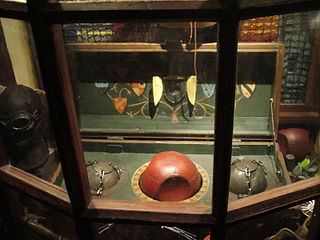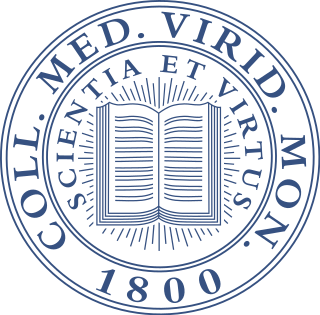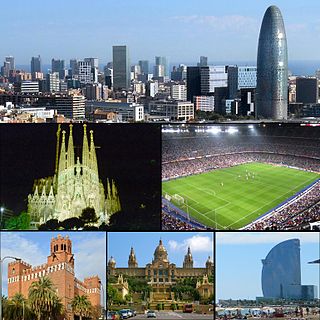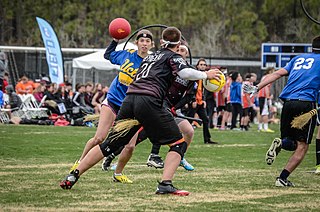
Quidditch is a sport of two teams of seven players each mounted on broomsticks played on a hockey rink-sized pitch. It is based on a fictional game of the same name invented by author J. K. Rowling, which is featured in the Harry Potter series of novels and related media.[3] The game is also sometimes referred to as muggle quidditch to distinguish it from the fictional game, which involves magical elements such as flying broomsticks and enchanted balls. In the Harry Potter universe, a "muggle" is a person without the power to use magic.

Sport has an important incidence in Catalan life since the beginning of the 20th century. The main sports in Catalonia are football, basketball, handball, rink hockey, tennis and motorsport.

Rivas Osos is an American football team based in Rivas-Vaciamadrid, Community of Madrid (Spain).
Rugby league is a team sport that is played in several regions of Spain. The game gained popularity in the autonomous community of Catalonia following the success of the Perpignan-based Catalans Dragons club in the Rugby League Challenge Cup and Super League from 2006 onwards. With rugby league having long been played in Northern Catalonia, the success of Catalans Dragons was the catalyst to spread the game to the rest of Catalonia. On June 20, 2009, the first Super League game was played in Barcelona in front of a crowd of over 18,500, Catalans Dragons lost 12 - 24 to the Warrington Wolves and a raft of new teams were formed in Catalonia around this time.
The 1909–10 season was the 11th season for FC Barcelona.

The Belgium national quidditch team, also known as the Belgian Gryffins, is the national team of Belgium in quidditch. The team was founded in 2014 upon the announcement of the 2014 IQA Global Games, the International Quidditch Association's second international tournament featuring national teams.

Quidditch Canada is the governing body that oversees quidditch within Canada under its mother organization, the International Quidditch Association.

Quidditch Nederland, formerly known as Muggle Quidditch Nederland, is the official governing body of the sport quidditch in the Netherlands, and affiliated with the International Quidditch Association and its European Committee. Quidditch is a sport which combines elements of handball, dodgeball, and rugby, and is derived from the fictional sport of the same name from the Harry Potter series. Its current president is Laurent Lardenois, and the Vice-President is Anna Bakker. Quidditch Nederland, then Muggle Quidditch Nederland, was founded in 2014 by Jerona van der Gevel and Bram Vries as part of Quidditch Benelux.
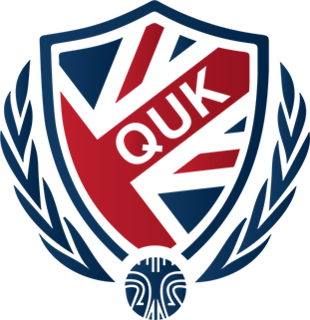
The United Kingdom National Quidditch Team, colloquially known as Team UK, is the official national Quidditch team of the United Kingdom. Team UK made its debut in 2012 at the IQA Summer Games in Oxford, UK where it placed 5th of 5 teams. The team then played in Canada at the 2014 IQA Global Games in Burnaby, BC on July 29, 2014 where it placed 4th of 7 teams and in the European Games in Sarteano, Italy in July 2015, placing 2nd of 12. Team UK gained its first medals at the IQA World Cup 2016 in Frankfurt on July 23–24, 2016, finishing 3rd out of 21 teams. In 2017 the team gained its first international trophy, winning the IQA European Games, beating France in the final.

Belgian Quidditch Federation, or BQF, is the governing body of quidditch in Belgium. It was founded in 2012 as a Facebook page to garner interest from potential players and teams within Belgium and began to take shape in 2013 with the introduction of its first two teams: Deurne Dodo's and the Brussels Qwaffles. The organisation began to take shape as a non-profit in early 2014 with the formation of the newly-international International Quidditch Association in the form an international federation. Belgian Quidditch Federation maintains one delegate within the IQA Congress as a member of Quidditch Europe alongside Quidditch Nederland (QNL) and the Luxembourgish Quidditch Federation (FLQ). On 10 October 2014, BQF changed its name from Belgium Muggle Quidditch to its current name to better integrate with other sports in the country.

Quidditch is a growing team sport in Canada. Due to its relative youth within the sports scene of Canada, adoption is not as widespread as other sports such as rugby or ultimate. However, adoption is picking up with additional university and community teams each year. As a result of its inclusivity and its many niche styles of play, a wider spectrum of individuals are drawn to this sport than other mainstream sports. For the moment, the majority of teams are based in Ontario, Quebec, British Columbia and Alberta, but teams are rapidly starting up in Saskatchewan, Nova Scotia and Manitoba. Quidditch Canada is the governing body for the sport across the country; there are no associations within Quidditch Canada that govern provincially/territorially.
The IQA European Games (EG) are the biennial games for the sport of quidditch held in Europe where national governing bodies send national teams to compete. The European Games were created in response to the IQA World Cup, the biennial tournament wherein nations from across the world compete in a similar style to the FIFA World Cup. Both Games alternate years so in the off years regional tournaments such as the European Games or the Asian Quidditch Cup can occur. These games are the highest level of championships in quidditch aside from Global Games. The 2015 champions were Team France, narrowly beating Team UK.

The Spanish Quidditch Association is the National Governing Body (NGB) of quidditch in Spain, affiliated to the International Quidditch Association. It began in 2013 as a Facebook page and as an internet forum, to coordinate and gather the players and teams that were appearing in Spain until it became an association.

The Spanish national quidditch team is a team created with Spanish quidditch players. Since 2015 it has represented Association Quidditch Spain in the different national team tournaments organized by the IQA.

Bizkaia Boggarts is a quidditch team based in Bizkaia, Basque Country, Spain. It was founded on December 6, 2014. Yeray Espinosa Cuevas is the captain and the coach Aitor Langarika. The first match they played was in 2015 Catalan Quidditch Cup against Imperius Zaragoza, winning 210*-70.

The Spanish Quidditch Cup is the main quidditch championship of Spain. It's an annual event, celebrated for the first time in 2016. The 2016 Spanish Quidditch Cup was the first edition of this tournament. It was played on the February 6th and 7th, 2016 in Campo Grande football fields in Rivas-Vaciamadrid, Madrid. 8 teams from Andalusia, Basque Country, Galicia and Madrid joined for this event where the locals, Madrid Wolves, won the championship beating Bizkaia Boggarts in the final 140-70*.

The 2016 Spanish Quidditch Cup was the first edition of this tournament. It was played on the February 6th and 7th, 2016 in Campo Grande football fields in Rivas-Vaciamadrid, Madrid. 8 teams from Andalusia, Basque Country, Galicia and Madrid joined for this event where the locals, Madrid Wolves, won the championship beating Bizkaia Boggarts in the final 140-70*.
The United States national quidditch team is the official quidditch team of the United States. The team is regulated by US Quidditch and is a national member of the International Quidditch Association. The team has won the most IQA World Cup titles, winning the 2012, 2014, and 2018 titles. The USNT only competes in events once every two years; at the IQA World Cup, as it is geographically ineligible for the only other current international Quidditch event; the IQA European Games.



